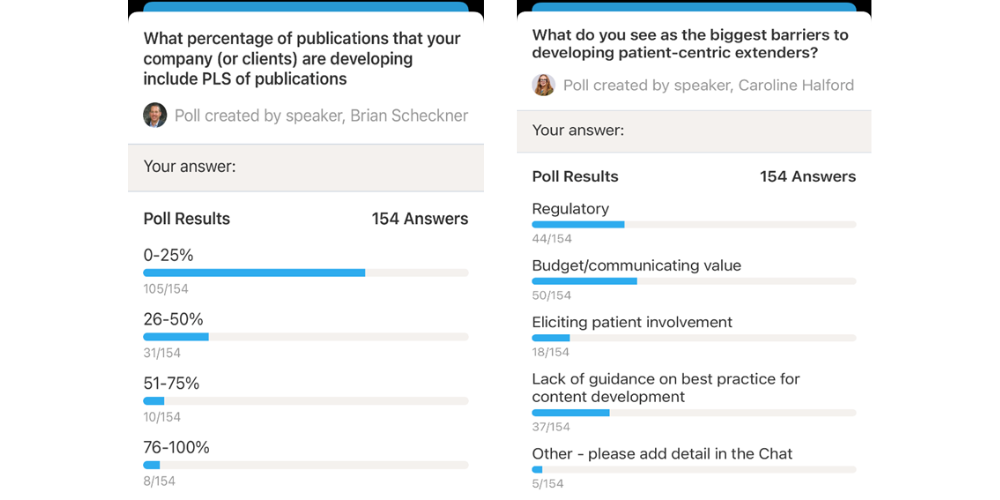Insights / Articles
ISMPP 2023 Parallel Session: Developing Patient-Accessible Publication Extenders: Key Stakeholder Perspectives
Written by Anna Frangou, PhD, Medical Associate; Julianne Hatfield, PhD, Associate Medical Director; Seán T. Anderson, PhD, Associate Medical Director on Friday, May 19, 2023
Research shows that publication extenders are becoming increasingly popular and are being used by lay audiences, including patients and their caregivers. As they become more ubiquitous, we need to ensure publication extenders serve the needs of both experts and lay audiences.
This session brought together representatives of multiple stakeholders (patients, publishers, pharmaceutical companies, and communications agencies) to discuss how publication extenders can be optimized for lay readers.
The session had two clear themes: (1) the need to develop patient-accessible content and provide patients with reliable peer-reviewed material with which to understand their disease, and (2) the positive impact patient perspectives have on healthcare professionals fully understanding the patient experience.
Publication extenders can be roughly divided into two categories: those developed for patients and those co-developed by patients. Content developed for patients often takes the form of (but is not limited to) plain language summaries (PLSs) and standalone PLSs of publications. Content co-developed by patients, necessarily includes patient perspectives and can take the form of review articles, commentaries, and podcasts. Where patients are actively involved in this way, the content has been shown to be highly impactful, as evidenced by high Altmetric scores and download numbers.
Key considerations when developing patient-accessible content are to: co-create and validate all content intended for a patient audience (rather than assuming patient needs are understood); follow the key principles of health literacy in all materials intended for a patient audience; consider the specific needs (e.g., audio/visual) of the intended patient audience (as may be determined by their condition); and enhance the learning experience by presenting information in an engaging way. A multi-media approach that includes audio, video, and interactivity can help reach the target audience and improve information retention.
Examples of innovative, patient-centric publication extenders were discussed, such as podcasts and their accompanying transcripts; the former includes authentic, non-scripted patient perspectives, while the transcripts increase the findability of the material online. Interactive podcasts were also mentioned, which allow patients to ask questions live or follow up later with questions and have them answered.
Finding the balance between content being accurate and engaging without being promotional was highlighted as a priority. For it to be engaging to the lay reader, as well as appropriate, comprehensible, and useful, patients should be involved early in the process of material development. The importance of working with patient advocacy groups to find patient authors and disseminate content was stressed, as these organizations are where patients tend to go for reliable information. To ensure the content stays strictly scientific, it should be checked for adherence to company publication policies and passed through peer review, as these are already geared to remove any commercial slant.
Our first pre-session poll (below, left) revealed that few respondents are currently including PLSs alongside their publications. The second poll (below, right) revealed some of the main barriers to including patient-centric publication extenders were perceived to be regulatory and budgetary issues and a lack of guidance on how best to develop PLSs.
To address this, our panel shared some tips on increasing the use of PLSs. These include pharmaceutical companies enabling the development of PLSs by engaging patients and caregivers wherever possible; prioritizing journals that peer review PLSs and allow open-access publications; developing a style guide for PLSs; and proactively budgeting for PLSs and enhanced patient-centric content in annual publication planning.

Panelists:
- Caroline Halford, Development Director, Medical Education, Springer Healthcare
- Brian Scheckner, Senior Director, Medical Communications (Medical Publications), Neuroscience Franchise, Jazz Pharmaceuticals
- Jasmine Malone, Head of Patient Copy, OPEN Health
- Jill Adelman, Independent Patient Advocate
Moderator:
- Anna Frangou, Medical Associate, OPEN Health
To learn more about best practices for the inclusion of the patient voice in the publication process and the importance of building trusted relationships with patient communities, read our whitepaper “Embracing the Patient Voice Within Publications”:
Working in partnership with our clients, we embrace our different perspectives and strengths to deliver fresh thinking and solutions that make a difference.
Together we can unlock possibilities.
For information about OPEN Health’s services and how we could support you, please get in touch.